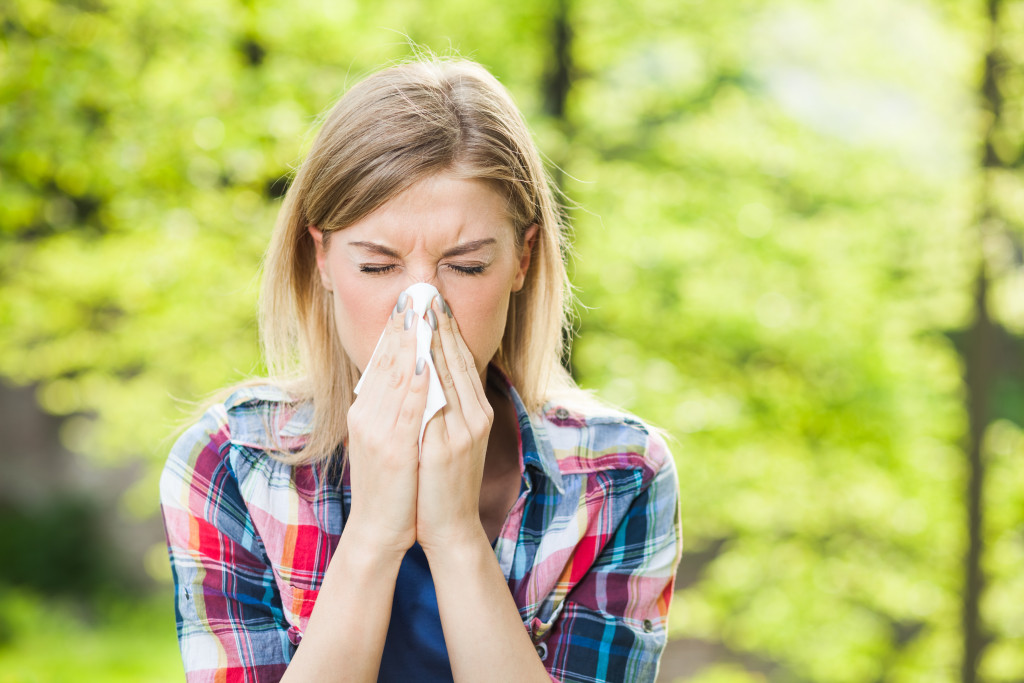Allergies are a big problem in the United States. According to the Asthma and Allergy Foundation of America, about 50 million Americans suffer from allergies. That’s one in every five people! Alongside allergies comes asthma, which is relatively common, affecting about 25 million people.
The population that’s most vulnerable to both are children. This is because their immune systems are still developing, and they come into contact with more allergens and pollutants.
Several factors contribute to the high numbers of allergies and asthma in the US. For one, our changing climate means more allergens in the air. We also have a high population density, which means more people are in close contact, spreading allergens. And finally, we have a lot of pollution, which can aggravate asthma symptoms.
Despite these challenges, there are many things you can do to manage allergies and asthma in your household. But first, you should learn what allergies are and how it affects people in general.
What are Allergies?
Allergies are a reaction of the immune system to a normally harmless substance. When you have allergies, your body thinks that these substances are harmful, even though they aren’t.
The cause of allergies is not fully understood, but it is believed to be genetic and environmental factors. For example, you are more likely to have allergies if your parents have them. But if you grow up in a clean, air-conditioned home, you may be less likely to develop allergies than someone who grew up on a farm. However, overly clean homes can lead to allergies.
A recent study has shown that children who live in overly clean homes can have more allergies than those in ordinary homes. This is important to remember if you want your children’s immune system to improve.
There are many different types of allergies that people can suffer from. Some of the more common ones include hay fever, pet allergies, food allergies, and dust allergies. Allergies can cause various symptoms, including itchy eyes, runny nose, sneezing, coughing, and difficulty breathing. Some severe cases can even lead to anaphylaxis – a potentially life-threatening reaction.
How do People Manage their Allergies?
There is no cure for allergies, but there are many ways to manage them. The best way to start is by identifying what triggers your allergies and then avoiding those things as much as possible.

Avoiding Allergens
You must get tested for allergies to identify what your triggers are. Once you know what they are, you can take steps to avoid them. For example, if you’re allergic to dust, you might want to invest in a HEPA air filter for your home. If you have pet allergies, you might need to find a new home for your furry friend.
There are also many products on the market that can help you avoid allergens. For example, there are special pillow covers and mattresses that keep dust mites away. You can also buy air purifiers and vacuums that remove allergens from the air.
Taking Care of Your Lawn
One of the most common allergens is pollen. They are often found in your backyard and technically everywhere. Even the dew of thick grass can carry some of them into your home. This is why it’s important that you get a lawn maintenance service every two to three months to ensure that your lawn is clean from allergens. Furthermore, you should also invest in a good-quality air purifier to keep the pollen levels down inside your home.
Eucalyptus Oil
If you suffer from allergies, you might want to consider using eucalyptus oil. This natural remedy has been shown to be effective in reducing symptoms of allergies such as the runny nose and itchy eyes. You can either add a few drops of eucalyptus oil to your diffuser or apply it topically on your chest and neck.
Quercetin
Quercetin is a natural antihistamine that can be found in many fruits and vegetables. It’s often used as a natural remedy for allergies because it can help reduce symptoms such as runny nose, sneezing, and itchy eyes. You can find quercetin supplements at most health food stores.
Taking Medication
If avoiding allergens is not possible or if your symptoms are severe, you might need to take medication. The most common type of medication for allergies is antihistamines. This type of medication helps to block the effects of histamine, which is a chemical that is released when you are exposed to an allergen. There are many different types of antihistamines available over-the-counter and by prescription.
There are also other medications that can be used to treat allergies, such as nasal sprays, corticosteroids, and bronchodilators. It’s important to talk to your doctor about which type of medication is best for you. You can even take allergen immunotherapy if advised by your doctor.
There are many ways to manage allergies, including avoiding allergens, taking medication, and using natural remedies. It’s important to find what works best for you and your family. By doing these things, your home should be allergy-free.

